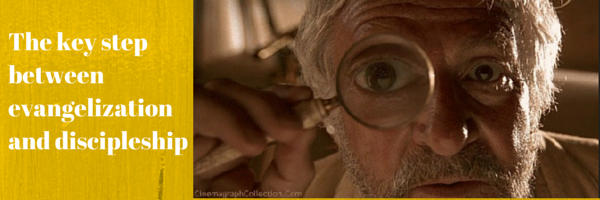by Deacon Ralph Poyo
For decades or even centuries, the local Church has lost sight of the process of making disciples. Within that process is a critical step that must be restored for the Church to become effective in making disciples of Jesus Christ.
It takes two procedures to make an Authentic Disciple of Christ.
- Evangelization – To connect a human heart to the heart of Christ through the indwelling power of the Holy Spirit. (As evident by the presence of the natural [Fruits-Gal. 5] and supernatural [Gifts-1 Cor. 12] manifestations of the Holy Spirit)
- Discipleship Training – To ground those new converts in a relationship with the Holy Spirit such that they are able to not only discern His voice and will, but desire (out of love for Him) to struggle to obey Him.
Most parishes today are doing zero percent evangelization and, if they are lucky, thirty percent discipleship. Therefore, the critical step needed between the two is not even on the horizon.
What is it?
The process of Evangelization is not complete unless there is natural or supernatural evidence of the indwelling of the Holy Spirit! The missing step is to evaluate whether the Spirit has actively shown up! Most parishes live according to what I call the Great Assumption. They assume that just because a baby was baptized, the Spirit has been activated in their lives. Yet they had no free will to engage in the relationship. The Spirit sits and waits for that soul to become properly disposed to Him. (To desire Him)
While many people believe that you are never really done evangelizing, that cannot be true. If so, the Apostles would never have been able to leave Jerusalem. They understood that before you can begin discipleship training, they must first receive (and see the evidence of his presence) the person they will be following – the Holy Spirit.
In Acts 8:14-17; we have an example of Philip looking for evidence of the indwelling of the Holy Spirit after he baptized the Samaritans. If he were not looking for evidence, he would have simply baptized them and continued on his missionary journey. Instead, he evaluated and discerned that the Spirit had not manifested in them. Thus, his return to Jerusalem and reporting that there was a problem.
Without inserting the evaluation step, we do not stop to see if we have accomplished the evangelization process. We simply omit the evangelization process all together and never examine whether proper disposition of the individual was achieved (CCC 1131, see last sentence)
This leaves the recipient believing that in going through the entrance sacraments, they have received all they need to attain heaven. Sound Familiar? This is why we battle with parents who only see a need for their children to “get their sacraments.” This is how they were formed in their religious education. We must give them the complete understanding.



